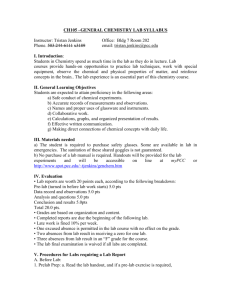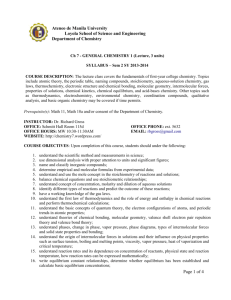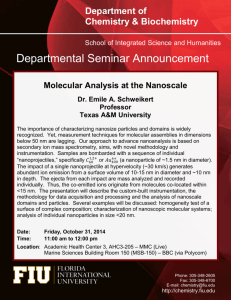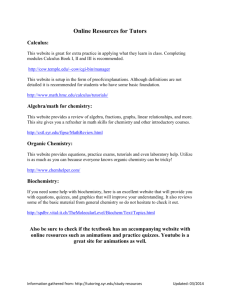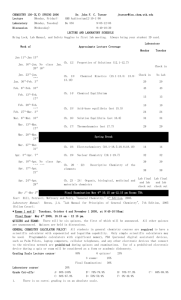policies on examinations, homework, pop
advertisement
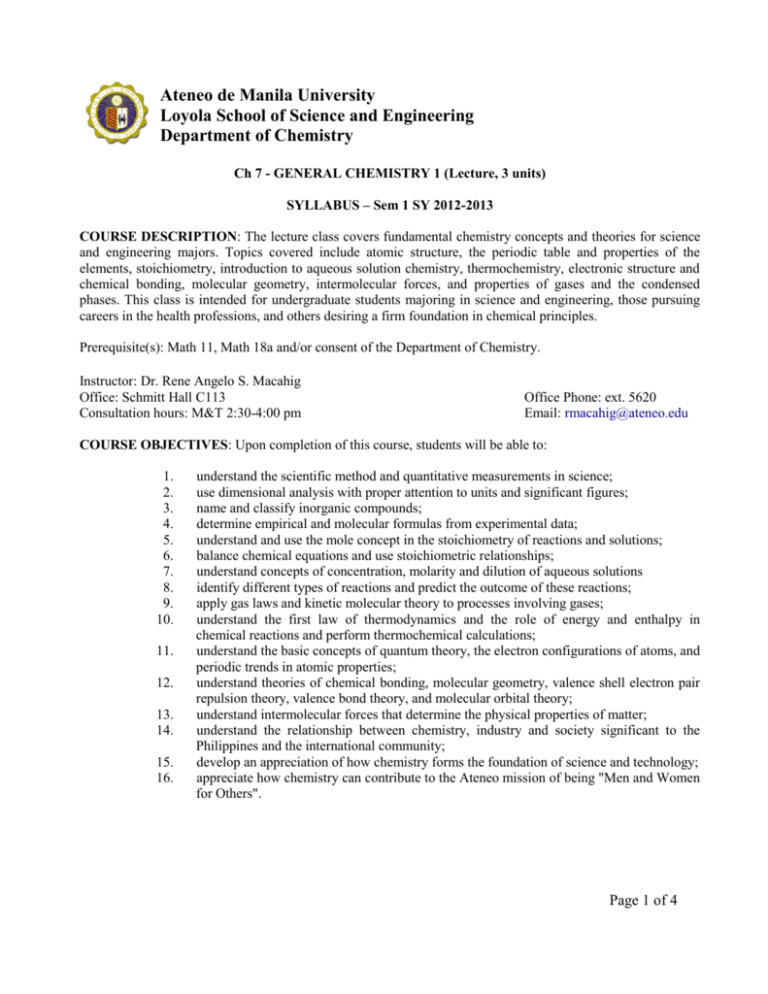
Ateneo de Manila University Loyola School of Science and Engineering Department of Chemistry Ch 7 - GENERAL CHEMISTRY 1 (Lecture, 3 units) SYLLABUS – Sem 1 SY 2012-2013 COURSE DESCRIPTION: The lecture class covers fundamental chemistry concepts and theories for science and engineering majors. Topics covered include atomic structure, the periodic table and properties of the elements, stoichiometry, introduction to aqueous solution chemistry, thermochemistry, electronic structure and chemical bonding, molecular geometry, intermolecular forces, and properties of gases and the condensed phases. This class is intended for undergraduate students majoring in science and engineering, those pursuing careers in the health professions, and others desiring a firm foundation in chemical principles. Prerequisite(s): Math 11, Math 18a and/or consent of the Department of Chemistry. Instructor: Dr. Rene Angelo S. Macahig Office: Schmitt Hall C113 Consultation hours: M&T 2:30-4:00 pm Office Phone: ext. 5620 Email: rmacahig@ateneo.edu COURSE OBJECTIVES: Upon completion of this course, students will be able to: 1. 2. 3. 4. 5. 6. 7. 8. 9. 10. 11. 12. 13. 14. 15. 16. understand the scientific method and quantitative measurements in science; use dimensional analysis with proper attention to units and significant figures; name and classify inorganic compounds; determine empirical and molecular formulas from experimental data; understand and use the mole concept in the stoichiometry of reactions and solutions; balance chemical equations and use stoichiometric relationships; understand concepts of concentration, molarity and dilution of aqueous solutions identify different types of reactions and predict the outcome of these reactions; apply gas laws and kinetic molecular theory to processes involving gases; understand the first law of thermodynamics and the role of energy and enthalpy in chemical reactions and perform thermochemical calculations; understand the basic concepts of quantum theory, the electron configurations of atoms, and periodic trends in atomic properties; understand theories of chemical bonding, molecular geometry, valence shell electron pair repulsion theory, valence bond theory, and molecular orbital theory; understand intermolecular forces that determine the physical properties of matter; understand the relationship between chemistry, industry and society significant to the Philippines and the international community; develop an appreciation of how chemistry forms the foundation of science and technology; appreciate how chemistry can contribute to the Ateneo mission of being "Men and Women for Others". Page 1 of 4 COURSE OUTLINE Suggested Textbook: Principles of General Chemistry, 2nd Edition by Martin Silberberg Topic/Activity Chapters Optional Topics Introduction to the Course and Orientation Keys to the Study of Chemistry 1 Arts and Origin of Chemistry; Calibration The Components of Matter 2 Naming of Organic Compounds Stoichiometry of Formulas and Equations 3 Yields in multi-step synthesis; A green chemistry perspective and yield Chapter Exam 1 @ 100 pts (1.5 hrs) Three Major Classes of Chemical Reactions 4 Balancing redox reactions; redox titrations; reversible reactions Gases and the Kinetic-Molecular Theory 5 Molar mass by Dumas method, chaotic world of gases (diffusion, effusion and collision theory) Thermochemistry 6 Constant volume calorimeter (Computations) Quantum Theory and Atomic Structure 7 Distinction between energy and matter (e.g. diffraction patterns) Electronic Configuration and Chemical Periodicity 8 Models of Chemical Bonding 9 Chapter Exam 2 @ 100 pts (1.5 hrs) Importance of Lattice Energy (no Born-Haber cycle, no calculations), metallic bonding Chapter Exam 3 (@ 100 pts 1.5 hrs) The Shapes of Molecules 10 Molecular shapes with more than one central atom (stereochemistry) Theories of Covalent Bonding 11 Molecular Orbital Theory Intermolecular Forces 12 The Solid State Other Topics (time permitting) 13, 14 Integration Period Final Comprehensive Examination @ 200 pts (2 hrs) Page 2 of 4 REQUIRED READINGS AND MATERIALS: Suggested Textbook: Principles of General Chemistry, 2nd Edition by Martin Silberberg Alternative Textbook: Chemistry, The Molecular Nature of Matter and Change, 4th Edition by Martin Silberberg (McGraw-Hill). A calculator capable of arithmetic, powers, and exponential functions is essential for examinations, quizzes and problem sets. No programmable calculators, or cellular phones or PDA based calculators are permitted for use during quizzes or examinations. Some students will benefit by referring to other texts. Those that the Department is particularly fond of include: Principles of General Chemistry by Petrucci, Harwood and Herring and Chemistry: The Central Science by Brown, Lemay and Bursten. POLICIES ON EXAMINATIONS, HOMEWORK, POP QUIZZES, AND EXEMPTIONS 1. There are three (03) pre-final chapter examinations @ 100 pts each. 2. In addition to the examinations, pop quizzes @ 10 pts each are given in class. The combined marks in these activities will be considered as another pre-final examination (100 pts). 3. One (01) final examination @ 200 pts will be offered during the final examination week. 4. The highest possible post-final score is 600 points. GRADING SCALE: . The percentage of total number of points accumulated (600 point basis) can be translated to a letter grade as follows: Percentage of Total > 91.5 86.5 - 91.4 79.5 - 86.4 72.5 - 79.4 65.5 - 72.4 59.5 - 65.4 0 – 59.4 Letter Grade A B+ B C+ C D F ATTENDANCE, DISCIPLINE AND HONESTY Attendance is required in all class lectures and examinations. Students may be allowed cuts up to a maximum of 20 percent the number of semester hours, which is about 5 absences for TTh classes or 9 absences for MWF classes. While the class roll may not be called regularly, you attendance will be under continuous scrutiny. Attendance in examinations is mandatory. In keeping with the Mission Statement of Ateneo, academic, professional, and personal honesty is imperative. The minimum penalty for dishonesty (e.g. cheating, plagiarism, etc) is a grade of zero for the particular Page 3 of 4 test/quiz/examination/problem set. Should there be evidence that a particular case is continuous or consistent, the maximum penalty allowed by the University will be pursued. POLICIES IN DETAIL SCHEDULE AND ASSIGNMENTS: Students are expected to complete the assigned reading before class and to keep up with assigned problems. Problem-sets will not be collected routinely except on those random occasions where it may be collected and counted as a quiz grade. You are encouraged to do all the homework problems and then some. Please see me during office hours if at any point in the semester you feel that you are having problems with the work. QUIZZES: There will be quizzes that will contribute a total of 100 points to your pre-final grade point total. Quizzes may be based on end-of-chapter problems or any instrument an instructor feels will provide incentive to keep up with the academic workload. Missed quizzes will be awarded a zero and can not be made up. EXAMS: There will be three (03) required pre-final examinations, each one being a “chapter” examination worth 100 points each. A final comprehensive final exam worth 200 points is given during the regular finals week. Examination dates will be announced ahead of time. Unexcused absences from any exam will result in a grade of zero for that exam. Valid reasons to excuse a student from taking an examination include: serious illness, or death or serious illness in the immediate family. In all cases, it is the student’s responsibility to notify the instructor, or the Department of Chemistry Secretary (Phone: X-5620), prior to the exam to be officially excused from the Exam. The mechanism for the make-up exam is left to the discretion of the instructor. CLASSROOM POLICIES: Absences, excused or unexcused, [about 5 absences for TTh classes or 9 absences for MWF classes] may result in a student receiving a grade of W for the course. Absences will also prohibit you from turning in homework, taking a quiz or an exam. Please arrive to class on time and maintain a courteous classroom. The use of cellular phones and computers during lecture is strictly forbidden. Please complete assignments before the lecture as you will be called on to solve problems. The teacher reserves the right to remove anyone from the classroom on the grounds of discourtesy to the teacher or to a fellow student. Academic dishonesty of any kind will be penalized and immediately reported to the Departmental Chair and could result in expulsion from the University. Your signature on exams and any other work submitted affirms that you understand the academic honesty requirement. If a student has a disability that interferes with learning, please see the instructor on a confidential basis so that a strategy can be devised to overcome whatever barriers might exist. END Page 4 of 4


